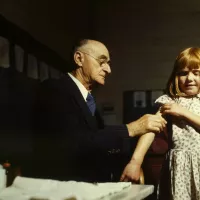The United States has participated in every modern Olympic Games except for the 1980 Summer Olympics, which they boycotted in protest of the Soviet Union's invasion of Afghanistan. The United States Olympic & Paralympic Committee (USOPC) serves as the national governing body for Olympic participation.
1900: U.S. at the 1900 Paris Olympics
At the 1900 Paris Olympics, the U.S. team participated with 75 athletes. Margaret Abbott became the first female American Olympic champion by winning the women's golf. Alvin Kraenzlein won four gold medals in track and field. The U.S. won a significant number of medals in athletics, showcasing their strength in the sport.
1904: U.S. Athletes Shine at the 1904 St. Louis Olympics
At the 1904 St. Louis Olympics, American athletes continued their success in athletics, with notable performances from Archie Hahn, James Lightbody, and Ray Ewry. The Games were held concurrently with the Louisiana Purchase Exposition, a world's fair.
1904: U.S. Achieves Record Medal Haul at the St. Louis Olympics
The 1904 St. Louis Olympics saw the United States achieve its largest medal haul in Olympic history, a record that remains unbroken.
1904: St. Louis Hosts the First Olympics Outside Europe
The 1904 Summer Olympics were held in St. Louis, Missouri, marking the first time the Games were held outside of Europe.
1904: Most skewed medal tally since 1904
The 1980 Moscow Olympics resulted in the most skewed medal tally since 1904, with the Soviet Union winning a record 80 gold medals, largely due to the US-led boycott.
1908: U.S. Track and Field Success Continues at the 1908 London Olympics
The U.S. continued its dominance in track and field at the 1908 London Olympics, with athletes like Ray Ewry, John Taylor, and Mel Sheppard winning gold medals. The Games also featured the controversial marathon finish involving Dorando Pietri and Johnny Hayes.
1908: U.S. Second Place Finish
The U.S. finished second in the medal standings in 1908.
1912: Jim Thorpe's Historic Victory and Subsequent Disqualification
At the 1912 Stockholm Olympics, Jim Thorpe, a Native American athlete, achieved a groundbreaking feat by winning gold medals in both the pentathlon and decathlon, becoming a celebrated figure in Olympic history.
1920: Medal Adjustment Note
It is important to note that a certain data set does not include two medals awarded at the 1920 Summer Olympics - one silver in ice hockey and one bronze in figure skating.
1920: Debut of Basketball and Ethelda Bleibtrey's Historic Win
The 1920 Olympics marked the introduction of basketball as an official Olympic sport, with the United States winning the gold medal. Additionally, Ethelda Bleibtrey made history as the first American woman to win Olympic gold in swimming.
1924: Harold Osborn's Record-Breaking Decathlon Victory
At the 1924 Paris Olympics, Harold Osborn not only clinched the gold medal in the decathlon but also set a new world record in the process, highlighting American athletic prowess.
1928: Johnny Weissmuller's Swimming Triumph and Aileen Riggin's Diving Milestone
In 1928, Johnny Weissmuller, later known for his portrayal of Tarzan, won two gold medals in swimming, while Aileen Riggin became the first American woman to win Olympic gold in diving.
1932: Outdoor Diving Debut and Helene Madison's Swimming Dominance
The 1932 Los Angeles Olympics saw the introduction of outdoor diving events. American swimmer Helene Madison dominated, securing three gold medals in freestyle events.
1932: Los Angeles Olympics Pioneer Electronic Timing
The 1932 Los Angeles Olympics saw the pioneering use of electronic timing devices, a significant technological advancement in the history of the Games.
1936: Jesse Owens' Triumph and the U.S. Second Place Finish
Jesse Owens became an icon at the 1936 Berlin Olympics, winning four gold medals and challenging Nazi ideology. However, for the first time since 1908, the U.S. finished second in the medal standings.
1936: U.S. Dominance Challenged at the Berlin Olympics
The U.S. faced a setback in its Olympic dominance at the 1936 Berlin Olympics, marking a shift in the global sporting landscape.
1948: The United States' Dominance in the Absence of the Soviet Union
The 1948 London Olympics marked the first participation of newly communist countries and the absence of the Soviet Union. The United States capitalized on this, comfortably leading the medal count and achieving significant success in track and field and swimming. Notably, the games were broadcast on television for the first time, albeit with limited public access.
1948: Post-War Olympics Mark a New Era
The 1948 Summer Olympics, held after World War II, signified a return to international sporting competition and a new era for the Olympic Movement.
1952: The Dawn of Soviet Participation and Continued U.S. Success
The 1952 Helsinki Olympics witnessed the first-time participation of the Soviet Union, marking the beginning of their dominance in the Games. Despite this new challenge, the United States maintained its top position in the medal count, excelling in track and field, basketball, boxing, and weightlifting.
1952: Soviet Union's Olympic Debut and the Rise of State-Sponsored Sport
The 1952 Olympics marked the debut of the Soviet Union, introducing a state-sponsored approach to international sport that would significantly impact the dynamics of the Games.
1952: Last time the US topped the gold medal count
The 1952 Summer Olympics marked the last time, before their 1964 victory, that the US had held the top spot in the gold medal count.
1952: China Returns to the Games
The 1984 Los Angeles Olympics marked the return of China to the Games after their last participation in 1952.
1952: US Boxing team parallels with 1952
The US boxing team's success in 1976, with five gold medals, drew comparisons to the stellar 1952 team that also achieved the same feat.
1956: Soviet Union's Controversial Presence and the Rise of Gymnastics
The 1956 Melbourne Olympics were marked by controversy surrounding the Soviet Union's participation following their invasion of Hungary. Despite calls for expulsion and boycotts, the Soviets competed and even engaged in a violent water polo match against Hungary. The United States secured second place in the medal standings, with notable success in track and field. However, the Soviets dominated gymnastics, signaling their growing athletic prowess. This Olympics was also the first to be broadcast live via satellite, expanding its global reach.
1956: Lowest attendance since 1956
The 1980 Moscow Olympics saw the smallest attendance since the 1956 Games due to the US-led boycott in response to the Soviet invasion of Afghanistan.
1960: 1960 Rome Summer Olympics
The 1960 Rome Summer Olympics marked a shift in the balance of power in international sports, with the US losing their dominance in events such as track and field and weightlifting. The US did, however, perform better than expected in boxing, swimming, and wrestling. In track and field, the US team faced setbacks, including a controversial disqualification of their winning men's 4x100 relay team. The US basketball team lived up to expectations, securing their fifth consecutive gold medal. The US finished with 34 gold and 71 total medals, while the USSR took home 43 gold and 103 total medals. This difference in performance demonstrated that the US was no longer the unchallenged leader in the Olympic Games. This was also the first Olympic Games to be broadcasted in the US on CBS, with extensive coverage.
1960: Improvement from the previous Summer Olympics
The US track and field team improved upon their performance at the 1960 Summer Olympics in Rome, where they faced setbacks, including a controversial disqualification of their winning men's 4x100 relay team.
1964: 1964 Tokyo Summer Olympics
The 1964 Tokyo Summer Olympics saw the US reclaim its position atop the gold medal count, a position it hadn't held since 1952. The US swimming team delivered an exceptional performance, securing 13 out of 18 possible gold medals and breaking 9 world records. The US track and field team also improved upon their 1960 performance, achieving 14 gold and 24 total medals. The Soviets continued to excel in Olympic weightlifting, claiming four gold and three silver medals, while the US program struggled. Despite a weak showing in boxing, where the US only managed one gold medal, the 1964 Olympics was a success for the nation. The US ended the Games with 36 gold and 90 total medals, surpassing the Soviet Union's 30 gold and 96 total medals. The US basketball team extended its winning streak, capturing its sixth consecutive gold medal by defeating the USSR in the final match, 73-59.
1968: 1968 Mexico Olympics
The 1968 Mexico Olympics stand as the most successful Summer Olympics for the US in the post-war era. US athletes brought home an impressive 45 gold and 107 total medals. The US swimming team dominated the competition, earning a remarkable 51 medals and sweeping the podium in five events. Adding to their dominance, the US swimmers medaled in all 29 swimming events, a feat unmatched by any other nation. The track and field team contributed significantly to the US' success, winning 15 gold and 28 total medals. The combined achievements in swimming and track and field accounted for over 70% of all US medals and secured the nation's top position on the medal table for the second consecutive Games, marking the first time the US topped the overall medal count since 1952. In other sports, the performance of American athletes was less impressive, such as weightlifting, where the team secured only one medal. American boxers earned 7 medals, including 2 golds, while US divers collected 6 medals. Despite a valiant effort, the men's volleyball team, who upset the reigning champions from the Soviet Union in a five-set match, fell short of a medal. The US basketball team continued their dominance, clinching their seventh straight gold medal, an accomplishment unmatched by any other Olympic team in ball sports. This Olympic Games marked the last time until 1996 that the US would claim the top spot on the medal table in a fully attended Summer Olympics. Notably, the US topped the medal standings in 1984, but those Games were impacted by the Soviet boycott. Notably, the 1968 Grenoble Winter Olympics, held earlier in the year, were the first to be broadcast in color, revolutionizing the viewing experience for global audiences.
1972: Rick DeMont's Disqualification and the USOC's Recognition
In 1972, swimmer Rick DeMont was stripped of his gold medal due to a positive test for a banned substance, which was present in his prescribed asthma medication. While the USOC recognized his win in 2001, the IOC hasn't reinstated his medal as of 2023.
1972: Soviet Union Surpasses the U.S. in the Medal Count
The 1972 Summer Olympics in Munich witnessed the Soviet Union surpassing the United States in the gold medal count, marking a significant moment in the rivalry between the two nations.
1976: 1976 Montreal Olympics
The 1976 Montreal Olympics saw the Eastern Bloc dominating the Games, with the United States finishing third in the medal standings for the first time. The US men's swimming team excelled, while the women's team faced challenges due to East German doping. The US boxing team performed admirably, and there were notable achievements in diving, equestrian, and shooting.
1976: US Failing to reach top two
The United States finished outside the top two in the medal count in the 1976 and 1988 Summer Olympics, marking the only instances where they did not secure a top-two position.
1979: Soviet Invasion of Afghanistan
The Soviet Union's invasion of Afghanistan in 1979 prompted a major boycott of the 1980 Moscow Olympics led by the United States.
1980: U.S. Boycotts the Moscow Olympics
In 1980, the United States led a boycott of the Summer Olympics in Moscow in protest of the Soviet Union's invasion of Afghanistan.
1980: 1980 Summer Olympics Boycott
The 1980 Summer Olympics in Moscow were marked by a US-led boycott due to the Soviet invasion of Afghanistan in 1979, resulting in a significantly smaller attendance and a skewed medal tally favoring the Soviet Union and East Germany.
1983: Restoration of Jim Thorpe's Olympic Titles
In 1983, after years of campaigning, Jim Thorpe's Olympic titles for the 1912 pentathlon and decathlon were officially reinstated, recognizing the injustice of their previous removal.
1984: Evelyn Ashford's Olympic Victory
Evelyn Ashford secured an Olympic gold medal in the women's 100 meters at the 1984 Los Angeles Olympics.
1984: Los Angeles Olympics Set New Standards for Ceremonies
The 1984 Los Angeles Olympics are renowned for setting new standards for opening and closing ceremonies, showcasing innovative and memorable spectacles.
1984: 1984 Los Angeles Olympics Boycott
The 1984 Los Angeles Olympics faced a retaliatory boycott by the Soviet Union and its allies, citing security concerns, though a record 140 nations, including China for the first time since 1952, participated.
1984: 1984 Los Angeles Summer Olympics
The 1984 Los Angeles Summer Olympics saw the US top the medal standings; however, the Soviet Union and several other countries boycotted the Games.
1984: U.S. Sets Gold Medal Record at the Los Angeles Olympics
The United States achieved a historic feat at the 1984 Los Angeles Olympics, setting a record for the most gold medals won in a single Olympics (83).
1985: Gorbachev's Perestroika
The implementation of Perestroika and Glasnost by Soviet leader Mikhail Gorbachev in 1985 played a role in the Soviet Union's decision to participate in the 1988 Seoul Olympics.
1988: Carl Lewis's Admission of Failed Drug Tests
Carl Lewis confessed to failing three drug tests during the 1988 US Olympic trials but maintained his innocence, asserting that he was among many athletes cleared to compete despite positive results, alleging a cover-up by the USOC.
1988: Controversy Surrounding Carl Lewis's Positive Drug Tests
Carl Lewis tested positive for banned stimulants, but the levels were low enough to warrant further investigation rather than an immediate ban, according to the IOC rules at the time. Lewis claimed inadvertent use through a dietary supplement, which the USOC accepted. The incident sparked debate about doping regulations and the acceptable levels of banned substances in athletes' systems.
1988: 1988 Seoul Olympics
The 1988 Seoul Olympics saw the Soviet Union participate despite initial concerns of a boycott. Cuba, however, boycotted the Games. The Soviets and East Germany dominated in their final Olympic appearances before their dissolution.
1988: Beginning of Alleged USOC Drug Test Cover-Ups
Wade Exum alleged that the USOC began covering up failed drug tests of some American athletes.
1991: Wade Exum's Tenure as USOC Drug Control Director Begins
Wade Exum began his role as the director of drug control administration for the USOC.
1992: U.S. Olympic Success in the Post-Soviet Era
Following the collapse of the Soviet Union, the United States experienced a period of significant success at the Summer Olympics, consistently ranking among the top nations in the medal count since the 1992 Barcelona Games.
1992: US Olympic performance improves since 1992
Since the 1992 Summer Olympics, the United States has witnessed a steady improvement in its Olympic performance across various sports.
1996: Atlanta Olympics Leave a Legacy of Urban Revitalization
The 1996 Atlanta Olympics played a role in revitalizing parts of the city and left behind sporting venues that are still in use today, demonstrating the lasting legacy of hosting the Games.
1996: 1996 Atlanta Summer Olympics
The 1996 Atlanta Summer Olympics marked the end of a 28-year period where the US did not finish first in the medal table in a fully attended Summer Olympics.
1996: U.S. Returns to the Top of the Medal Table
The United States reclaimed its position at the top of the medal table at the 1996 Summer Olympics, marking a resurgence in American Olympic success.
2000: Wade Exum's Tenure as USOC Drug Control Director Ends
Wade Exum concluded his time as the director of drug control administration for the USOC.
2001: USOC Recognizes Rick DeMont's 1972 Olympic Win
Despite the IOC's stance, the USOC recognized Rick DeMont's gold medal performance in the 1972 Olympics.
2002: Salt Lake City Winter Olympics Boost U.S. Winter Sports
Hosting the 2002 Winter Olympics in Salt Lake City had a significant impact on the U.S. winter sports program, leading to improved performance in subsequent Games.
2002: Salt Lake City Marks a Turning Point for U.S. Winter Olympics Performance
The 2002 Winter Olympics in Salt Lake City marked a turning point for the United States in Winter Olympics performance, as the nation began to consistently rank among the top medal winners.
2003: Wade Exum's Allegations Against the USOC
Wade Exum, former USOC drug control administration director, accused the organization of covering up failed drug tests of about 100 American athletes from 1988 to 2000.
2006: 2006 Winter Olympics: Lindsey Jacobellis's Medal
Lindsey Jacobellis won her first Olympic medal, a silver, at the 2006 Winter Olympics in Turin, marking the beginning of her successful Olympic career.
2008: US finishes second in 1992 and 2008
The United States achieved a second-place finish in the medal count at both the 1992 and 2008 Summer Olympics.
2010: 2010 Winter Olympics: Team USA Performance
Team USA experienced a peak in medal count at the 2010 Winter Olympics, securing 37 medals, showcasing a strong performance across various events.
2010: U.S. Achieves Record Medal Haul at the Vancouver Winter Olympics
The United States achieved its highest-ever medal count at the 2010 Winter Olympics in Vancouver, winning 37 medals and demonstrating significant progress in winter sports.
2014: 2014 Winter Olympics: Team USA Performance
The 2014 Winter Olympics saw Team USA win 28 medals, indicating a slight decline from their 2010 performance but still a substantial achievement.
2016: USOPC Medal Bonus Amounts
As of 2016, the US Olympic & Paralympic Committee paid Olympic medalists $25,000 for gold, $15,000 for silver, and $10,000 for bronze.
2016: Simone Biles withdraws from all-around final
At the 2020 Tokyo Olympics, Simone Biles, the 2016 Olympic all-around champion, withdrew from the gymnastics all-around final, creating an opportunity for her teammate, Sunisa Lee.
2017: Increase in USOPC Medal Bonus Payouts
Starting in 2017, the USOPC raised medal bonuses to $37,000 for gold, $22,500 for silver, and $15,000 for bronze, a 25% increase from the previous payouts.
2018: Equal Pay for Paralympic Athletes
From 2018 onwards, Paralympic athletes started receiving the same bonus amounts as Olympians, a decision reflecting a push for pay equity in sports.
2018: 2018 Winter Olympics: Team USA Performance
Team USA won 23 medals at the 2018 Winter Olympics, which was two fewer than they earned at the 2022 Winter Olympics.
2018: U.S. Experiences a Dip in Medal Count at the Pyeongchang Olympics
The United States experienced a decrease in medal count at the 2018 Winter Olympics in Pyeongchang, highlighting the competitive nature of winter sports on the global stage.
2020: 2020 Tokyo Olympics
The 2020 Summer Olympics, held in Tokyo, were postponed to 2021 due to the COVID-19 pandemic.
December 31, 2021: Information Updated
On December 31, 2021, the provided information was updated.
2022: 2022 Winter Olympics: Team USA Overview
The US participated in the 2022 Winter Olympics under a diplomatic boycott due to human rights concerns in China. They won 25 medals, marking a decline from previous years but still included notable achievements.
2023: IOC's Continued Refusal to Reinstate DeMont's Medal
As of 2023, the IOC has not budged from its decision and continues to refuse to restore Rick DeMont's 1972 Olympic gold medal.
May 26, 2024: Information Updated
On May 26, 2024, the provided information was updated.
2028: Los Angeles to Host its Third Olympics
In 2028, Los Angeles will host the Olympic Games for the third time, further solidifying the city's connection to the Olympic Movement.
2034: Salt Lake City to Host its Second Winter Olympics
In 2034, Salt Lake City will host its second Winter Olympics, highlighting the city's capacity and infrastructure for hosting world-class winter sports events.
Mentioned in this timeline

Basketball is a team sport played on a rectangular court...

Simone Biles is an American artistic gymnast recognized as the...
CBS Broadcasting Inc CBS is a prominent American commercial broadcast...
The Union of Soviet Socialist Republics USSR existed from to...
Germany officially the Federal Republic of Germany is a nation...
China officially the People's Republic of China is an East...
Trending
28 minutes ago Pokemon Celebrates 30 Years: A Cultural Phenomenon with Multimillion-Dollar Cards

28 minutes ago Daylight Saving Time 2026: Prepare to set your clocks forward and lose sleep.

28 minutes ago Indiana Investigates CenterPoint Energy Amid Bill Concerns and New Utility Law.

28 minutes ago Galatasaray's Champions League opponent revealed; Liverpool legend comments on Juventus match; Real Madrid faces Man City.

2 hours ago Google Maps to fully function in South Korea after data agreement.

3 hours ago CDC Panel to Discuss COVID-19 Vaccine Injuries Following RFK Jr.'s Meeting
Popular

Jesse Jackson is an American civil rights activist politician and...

Barack Obama the th U S President - was the...

Susan Rice is an American diplomat and public official prominent...

XXXTentacion born Jahseh Dwayne Ricardo Onfroy was a controversial yet...

Michael Joseph Jackson the King of Pop was a highly...

Kashyap Pramod Patel is an American lawyer who became the...